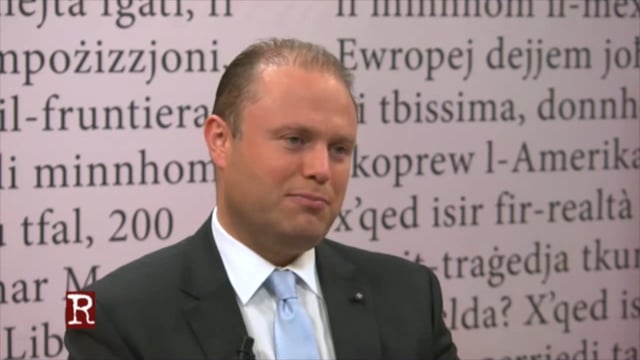[WATCH] Muscat’s 15-year plan: ‘five years in opposition, 10 years in government’
Prime Minister Joseph Muscat agrees with banning freemasonry • non-committal on parliamentary secretary Michael Falzon following IAID report


Prime Minister Joseph Muscat always had a plan: that of leading the Labour Party for 15 years – five years in opposition and 10 years in government.
Interviewed by Saviour Balzan on Reporter, the Prime Minister has never been more clear on his intentions for the coming two terms.
“I always said that we have – that I have – a 15-year plan; five years in Opposition and 10 years in government,” Muscat said, suggesting that he would be exiting the political scene, aged 49.
In a post-budget interview, Muscat spoke of his government’s economic vision, the environment, traffic, reacted to criticism raised by Opposition leader Simon Busuttil, and spoke of the much-needed reform at the Lands Department.
He agreed that secret organisations such as freemasonry should be banned and shared his thoughts on ‘a new era’ for political parties.
The Prime Minister praised the invaluable work being carried out by the President of the Republic.
MaltaToday on Sunday revealed that the Office of the Prime Minister could be in a strong legal position to recoup lands granted to the property entrepreneur Marco Gaffarena, from a controversially fast-track expropriation of a Valletta palazzino he owned.
An inquiry by the OPM’s internal audit and investigations department (IAID) which was handed over to the Auditor General, has revealed that the lands granted to Gaffarena as payment for the Valletta property expropriated from him, was in excess of a legal 30% ceiling which such land valuations cannot exceed.
Muscat was non-committal as to what may happen to parliamentary secretary for lands Michael Falzon, but said that Falzon “does a good job”.
“Michael is my friend; he does a good job. But I cannot comment on the case or about Michael because the case is now being investigated by the NAO,” Muscat told Balzan.
Admitting that the Old Mint Street saga had bothered him, Muscat reiterated that – depending on the outcome of the investigation – he would ensure that the property is returned back.
He however spoke of a much-needed reform at the Lands Department, where check and balances were non-existent.
Muscat admitted that his government had underestimated the change in the psyche of the people towards the environment following the spring hunting referendum.
“We could have taken decisions differently … and I know that the NGOs are genuine in their criticism. But how can the Opposition leader be credible when he’s surrounded by the same people who ruined the environment?”
There’s no love lost between the two leaders and Muscat had a single word to describe Busuttil as an opponent: “He’s bitter.”
The Prime Minister said Busuttil had come out “all guns blazing” against individuals who used to work at One Productions.
“I immediately received a list of all the people who used to work with NET before they were given other jobs by the previous administration. I could have used it in my budget reply but I chose to discard it. People are tired of listening to these things. They don’t impress them.
“Once I remember being on Xarabank and calling [then PM] Lawrence Gonzi ‘a liar’. The media came out against me and editorials were written because that was not language befitting a politician. And they were right. So, I never used it again. But this is an Opposition leader who insults me in every possible way and manner. And I let him be because ultimately he’s making a fool of himself.”
Muscat claimed that he later received calls and messages from Nationalist MPs disassociating themselves from the attack launched by Busuttil during the budget speech.
Speaking of how his government’s decisions resulted in increased economy growth, Muscat rejected the notion that Labour and PN shared the same economic ideals.
“I don’t think the PN today believes in the strength of the private sector. It thinks that businesses are against environment, good governance and common sense. On the other hand we think that anything that can be done by the private sector should be done by the private sector.”
He insisted that a progressive economic policy for a social democrat meant “allowing the market to operate but leading the market to allow the generation of wealth through economic growth”.
“Trickle down economics is not all … we believe in creating wealth and for the state to intervene to help the most vulnerable and push forward the middle class.”
It is not the first time that Muscat boasted of being a rightist on economic issues and a leftist on social matters.
He argued that ‘the era’ of political parties was slowly coming to an end, replaced by movements.
“For political parties to remain relevant they need to be vehicles for bigger movements, bringing together people who have a vision for the country but who do not necessarily want to be active all the time.”



.png)











.jpg)







